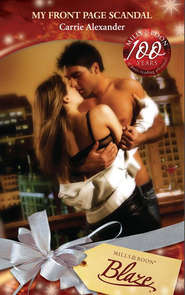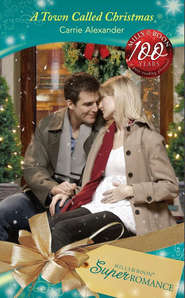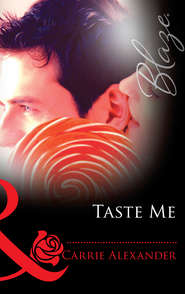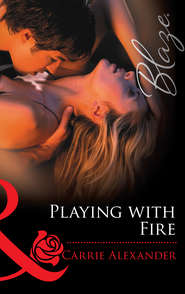По всем вопросам обращайтесь на: info@litportal.ru
(©) 2003-2025.
✖
Cowboy Comes Home
Автор
Год написания книги
2019
Настройки чтения
Размер шрифта
Высота строк
Поля
“When do you want me?” The question felt loaded.
She knew it, too, answering him only with a wry expression.
“I can pack and check out in five minutes,” he said.
“You’re not staying at the Stones’?”
“No.”
She didn’t ask why, but a worry line appeared between her eyebrows. “I did some work on the cabin last night, but it’s still a mess.”
“That’s okay. I can help fix it up.”
This time, her smile stayed a while longer. Someday he’d get her to laugh again. “You’re sure in a rush to start shoveling shit.”
“Is that my job? Damn. You never said I’m your new Rooney. Next you’ll be peppering my snuff.”
“R-r-right. When you start walking bowlegged, I’ll let you know.” She tossed her hair over her shoulder and got in the car. It was a red Camaro with Nevada plates, a dozen dings and rust spots past the point of well maintained. “Listen. There’s no rush. Come by any time next week, if you’d rather.”
So she wasn’t ready. “I want to get settled in.”
“What about your mother? Wouldn’t you like to spend more time with her?”
“She’s not going anywhere.” And neither was he. It was time to face the past. Maybe he couldn’t fix the things that had gone wrong or enact some kind of ideal reunion with his father, but he could learn how to live with the truth—openly. Writing the memoir could turn out to be a healing experience, not just a divisive one.
Meg said, in a rather stilted way, “Tell Virginia that she’s welcome at Wild River anytime, if she wants to visit with you.”
Rio nodded. Meg put up her window, withdrawing into the dark interior as she reached for the ignition. She must have known, or sensed, that his mother still blamed her for the supposed ruination of Rio’s future. He gave her credit for making the first overture, however small.
“I will,” he said, though she was driving away. He waved at the departing car.
From Edna’s, Virginia watched, her face placid but her worry palpable. Rio told himself he knew what he was doing.
CHAPTER THREE
THE NEXT MORNING, Meg woke to the smell of frying bacon. She burrowed deeper into her bed, awash with memories of a time when her mother was alive and active. They had filled out the small kitchen table perfectly—two parents, a little girl who swung her legs against the chair rungs, and Rooney, a grizzled, guffawing “uncle” who used to give her quarters for candy and gum.
Mornings for the past few months had been ascetic. Caffeine was her only remaining vice. Sitting at the same table with the coffeemaker at hand, she’d made lists of chores, lists for the feed store and hardware store, lists of low-cost ways to advertise her training stable. She’d never been a list maker before, but she’d thought that having it all written down would get her going, and doing.
Some days, it worked. Others, not.
She’d learned soon enough that there wasn’t a list on earth that could write away her loneliness.
This morning was different. Rio was in the house. She was up and out of bed, showered and half-dressed before she realized it.
When she entered the kitchen, he was laying strips of bacon on a folded paper towel. Tall, brown, in a red plaid flannel shirt, jeans and stocking feet. A lock of black hair fell in his eyes. He looked up and flashed a white smile. “Morning, Meg. I started breakfast.”
“That’s not your job. But thanks.” Her stomach growled. “I guess I’m starved.”
“Good. You’re too thin.”
“Yeah, well, you look like you could use a few home-cooked meals yourself.”
“That’s what my mother says.”
Rio’s mother. He’d brought her up several times yesterday, as they were working on the cabin. He’d kept it all casual, but Meg had the feeling that he was planning to get them together and talking, despite their agreement that he was here for a job, not a lovey-dovey reunion.
She did have some fond memories of Virginia Carefoot. For a time, the woman had seemed like just about an ideal, motherly kind of mother to Meg, even when her own had still been alive. But then she’d grown up and Virginia had become quietly disapproving of the relationship between her upstanding son and the town’s bad girl. From a more mature perspective, Meg could hardly blame Mrs. Carefoot for that. She’d been dead right in predicting that Meg would lead Rio to a sad end.
“You go feed the horses,” she told him. “I’ll finish breakfast.”
“I already fed them.”
“Oh.” She glanced at the clock. “I overslept.” She would have sworn that having Rio on the ranch would keep her tossing and turning, but instead she’d conked out for a solid nine hours—the longest she’d slept in years. “I’ll start setting an alarm.”
“No problem. I can take over the morning feeding. I’m closer to the barn, in the bunkhouse. The horses wake me anyway.”
“Um, okay, then how about pancakes?” She reached for the canister of flour. A carton of eggs was open on the counter. She cracked several into a bowl, glad to have something to do with her hands. He was watching and that made her skittish.
“Sure, if they’re apple.”
“Why not.” Yesterday, she’d bought more produce than she had in the previous ninety days. A mixing bowl filled with Macintoshes sat on the table. “If you slice them up, nice and thin.”
He got a knife and sat at the table. She drained the grease from the cast-iron frying pan, the same one that had always been used at the ranch. She added milk and baking soda to the mixing bowl and began whisking the batter. “So…you seem to have settled in all right.”
Her scalp prickled from the sensation of Rio’s gaze on the back of her head. “I’m at home here,” he said easily. “Nothing’s changed.”
“Except you’re sleeping in the bunkhouse.”
“We did that a few times. Remember?”
Hell, yes, she remembered. As kids, they’d thought it was great fun to take over the cabin on the rare nights that Rooney was gone. They’d played at being cowboys, with a campfire and beans heated in the can and served on tin plates. They’d rolled out their sleeping bags and told ghost stories and dirty jokes that they hadn’t half understood, until finally they couldn’t keep their eyes open any longer.
But there’d been other nights, too, when they’d grown older. In the cabin, in the barn, even, once or twice, in Meg’s bedroom. Her father would have banned Rio from the ranch if he’d ever caught them. That had been half the thrill for her.
“I remember.” She poured a dollop of the batter into the pan and watched the sizzling edges as if they were mesmerizing. Remember was a dangerous word for them.
Rio nudged her. “The apples.”
She stepped away. “Go ahead.”
He laid slices in the frying pancake. “Remember when we tried to roast apples over the campfire?”
“Sure.” That word again—remember. Was he deliberately making her recall how easy things used to be between them? “We stuck them on sharpened sticks. They came out all black and crisp outside and raw inside.”
“Those were good times.”
“Yeah.” Meg retreated. Leaving Rio to flip the pancakes, she snatched one of her lists off the sloppy pile of notepads, instruction manuals and several outdated phone books on top of the fridge. “We should go over the day’s chores. Get it straight how things are going to be around here.”











